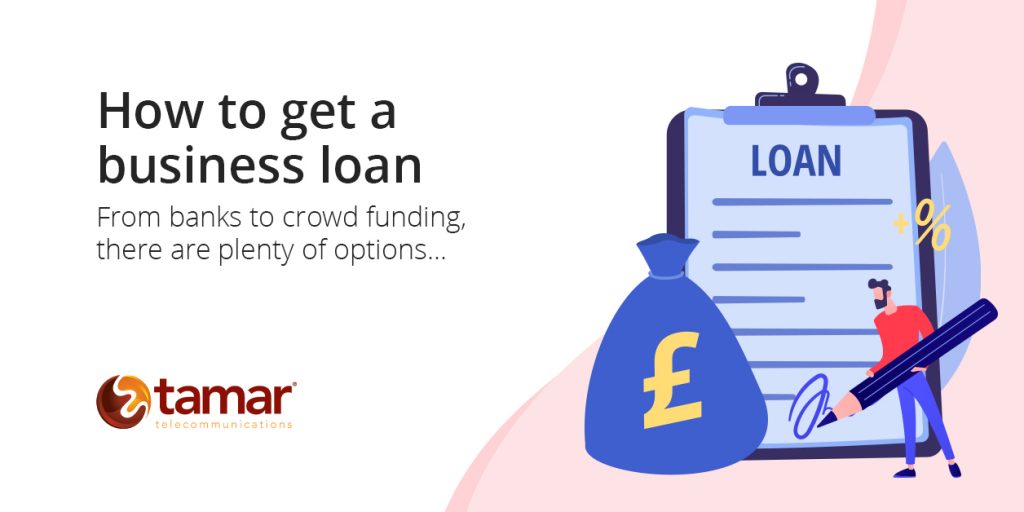Want to learn how to get a business loan for your new venture? New businesses have myriad start-up costs, ranging from big outlays on premises, staff and inventory, to cheaper-but-crucial details like paying for web hosting, putting money aside as petty cash, and setting up a business telephone number.
Such costs combine to create a major barrier to entry into all sorts of industries, preventing newcomers from setting up shop. One way to meet the challenge of start-up costs is to rely on personal wealth as a source of funding; another is to give away equity in the business to a backer.
Unfortunately, these options are not available to all entrepreneurs, and many will find their best or only option is to seek a business loan instead. In this article, we introduce four key types of business loan that could help get your venture up-and-running.

Apply for a state-backed start-up loan
UK businesses which have been fully trading for less than 24 months can apply for a state-backed start-up loan between £500 and £25,000.
These loans are managed by The Start Up Loans Company, a subsidiary of the British Business Bank which was set up in 2012 to deliver the government’s Start Up Loans programme. To start your application, simply register with The Start Up Loans Company.
Start-up loans are given as a personal loan, rather than a business loan, meaning the loan is paid to and repayable by the business founder, not their company. Repayments are made monthly over the duration of the loan period.
A start-up loan from the state is a great way to lay the foundations of your funding mix. With a fixed interest rate of 6% a year, this is one of the most affordable business loans you’re likely to encounter. Unfortunately for overseas entrepreneurs, these loans are only available to UK residents whose business is based in the UK.
Get a business loan from a bank
A wide array of UK banks and credit brokers offer business loans, ranging from well-known high street names like NatWest and HSBC to specialists like Think Business Loans and Funding Xchange.
In a business loan, the business could potentially borrow anywhere from £1,000 to £3,000,000 from the lender. Repayment of the loan, plus interest, must be made within a set time period of the loan date, which could range from 1 month to 15 years. While there are many types of business loan, all business loans can be broadly categorised as either an unsecured loan or a secured loan. An unsecured loan allows the business to borrow money without using any of its assets as security, while a secured loan does require the use of a business asset as security, in case the business cannot repay the loan as planned.
Another common requirement with bank loans is for a director of the loanee business to act as a guarantor of the loan. This means they will be held personally liable for the loan, if the business fails to meet its obligations to the lender.
If you are thinking about getting a business loan from a bank or credit broker, money.co.uk’s business loan comparison would be a good place to start your research.
Pitch for a loan within your personal network
Seeking a loan from friends, relatives, acquaintances or work contacts can be a risky approach, since the successful repayment of the loan may have personal implications, as well as financial ones.
With that said, if you are very confident in your projected revenues – for instance, if you have received a high-value order from a client, and you require the loan in order to fulfil the order – then pitching for a loan within your personal network could be a suitable option.
The key benefit of borrowing from people you know, versus borrowing from a bank, is the relative ease of obtaining and repaying the loan. You may be able to agree on a flexible repayment plan, you might not need to have a spotless credit history, and you probably won’t be required to put up personal collateral such as the mortgage on a property.
Consider crowdfunding as an alternative
Crowdfunding is the funding mechanism where a business asks for relatively small amounts of funding from multiple online backers, until it reaches a monetary ‘goal’ figure which enables the venture to happen. Contributions to crowdfunding are often incentivised through a tiered reward system, where backers receive a reward commensurate with the amount of money they pledge.
Good crowdfunding projects use a mix of rewards aimed at both self-interested and philanthropic backers. Some backers will just want to get their hands on the product; others may wish to offer a higher level of support, because they want the business to succeed.

While crowdfunding is not quite the same as a business loan, there are important similarities. First and foremost, this type of funding is widely used by entrepreneurs to execute a business plan which seems highly likely to succeed, subject to securing the funding needed to fulfil initial orders. Crowdfunding has a major advantage over bank loans in this regard, as the pledges made by backers should confirm that the venture can achieve the required volume of sales at launch.
Popular crowdfunding platforms include Kickstarter, Indiegogo and Crowdfunder.
If all else fails, revisit your business plan
Hopefully one of the options discussed in this article, or some combination of them, have helped you learn how to get a business loan to make your business viable.
If you have investigated state-backed start-up loans, bank loans, loans from peers and crowdfunding, and none of those methods have provided the answer, you may benefit from shifting your attention to your business plan. Are you able to significantly reduce your projected costs, at least in the short term, and bootstrap the business on a budget? Where there’s a will, there’s a way.







